#gaddafism
Text
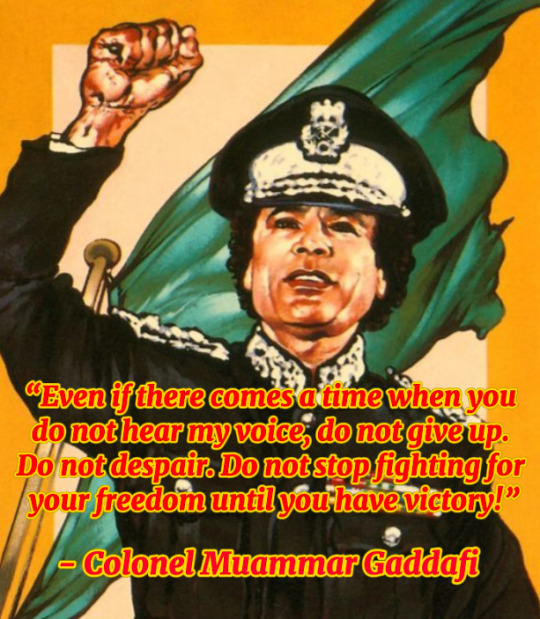
Bam Bam Bam
8 notes
·
View notes
Text
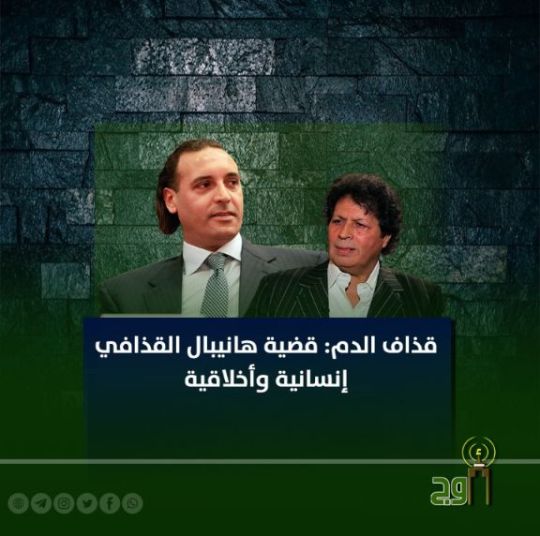
The former coordinator of Libyan-Egyptian relations, Ahmed Qaddaf Al-Dam, explained in an interview on the Saudi Al-Arabiya channel that the issue of Hannibal Muammar Gaddafi is a humanitarian and moral issue, adding that Lebanon has become like Libya and we are all striving, along with the charities in Lebanon, to get Hannibal out, continuing, “We hope he will forgive.” "It is for those who imprisoned him and those who abused him."
3 notes
·
View notes
Text

PUTIN ASKS THE IMPORTANT QUESTIONS:
1. Are there any sanctions against ISRAEL for the murder and destruction of innocent Palestinian women and children?
2. Are there any sanctions against AMERICA for killing and destroying lives of innocent women and children in Iraq, Syria, Afghanistan, Cuba, Vietnam, and even stealing their diamonds and gold?
3. Were there any sanctions against AMERICA/FRANCE over the killing of Muammar Gaddaf and the destruction of Libya?
4. Has there ever been an American/NATO soldier ever been punished for raping and torturing innocent women/children of all the aforementioned countries?
5. Are there sanctions against FRANCE for causing crisis and unrest in several African countries? These are very war crimes America and NATO should be punished.
Maybe it's time we understand that NATO, USA and all their allies are the most dangerous evils of our time. So we need to change the balance of power in the world and ensure everyone has equal rights and stop the oppressors.
3 notes
·
View notes
Text

it’s almost ridiculous how much time I spend writing essays for no reason other than I like to lmao.
#op#socialism#communism#marxism#leninism#maoism#cultural revolution#revolution#hoxhaism#gaddafism#essays#writers on tumblr#artists on tumblr#china#albania#libya#mao#hoxha#gaddafi#book#books#cambodia#khmer rouge#critique
3 notes
·
View notes
Text
the hole they found gaddaf in is a fascist and remade as the hole they found saddam in btw
3 notes
·
View notes
Text
Esclusiva: "In Libia armi chimiche in mano all'Isis e alle milizie già dal 2014"
(di Vanessa Tomassini - corrispondente da Tunisi) L’inviata speciale dell’Onu ad interim, Stephanie Williams, ha messo in guardia sul possibile uso di nuove armi letali in Libia. Il 22 aprile 2020 diversi rapporti circolanti sui social media, indicavano che le forze armate orientali avrebbero usato armi chimiche contro le forze affiliate al Governo di Accordo Nazionale (GNA) a sud di Tripoli. Solo pochi giorni fa il ministro degli Interni di Tripoli, Fathi Pashaga, ha accusato in una conferenza stampa il gruppo russo di mercenari Wagner di aver effettuato un attacco ad armi chimiche sul fronte sud di Tripoli e di aver aperto al proposito un’indagine, richiesta anche dal Libyan National Army (LNA). Un classico della narrativa già ampiamente adoperata in Siria, dove ad essere accusati di utilizzare armi chimiche contro i civili è il presidente Bashar al-Assad e i suoi alleati.
Sebbene questi rapporti siano ancora in fase di verifica, dal novembre 2019, ho indagato sulla possibile presenza di armi chimiche già sul territorio libico ed in mano a gruppi armati statali e non. Tra ottobre e novembre dell’anno scorso, un giovane originario di Sirte, che ha fatto parte di un piccolo gruppo armato unitosi tra il 2014 e il 2015 al sedicente Stato Islamico (Isis o Daesh) dopo diversi viaggi dei leader in Siria e in Iraq, mi ha contattata affermando che i gruppi armati di Misurata, sotto l’egida di Salah Badi stavano mobilitando delle armi chimiche all’interno della città.
Se l’uomo è stato in grado di fornirmi evidenze della sua appartenenza a Daesh mostrandomi foto e video degli addestramenti nel deserto, o immagini del gruppo con le classiche bandiere nere della morte, non aveva prove di questa mobilitazione di armi chimiche a Misurata.
Ho deciso comunque di indagare e da una ricerca di informazioni in rete, risulta che alcune delle armi chimiche furono sottratte da uomini armati nel 2014 dopo aver preso d’assalto la fabbrica chimica nel distretto di Jufra, dove erano stati immagazzinate dai tempi del colonnello Muammar Gheddafi.
La mia fonte è convinta che non si tratti dell’unico furto di armi chimiche avvenuto nel corso degli anni nel Paese nordafricano, ma sostiene infatti che un’altra sottrazione avrebbe avuto luogo durante le operazioni di carico al porto di Misurata condotte dall’Organizzazione per la proibizione delle armi chimiche (OPCW) nel 2014.
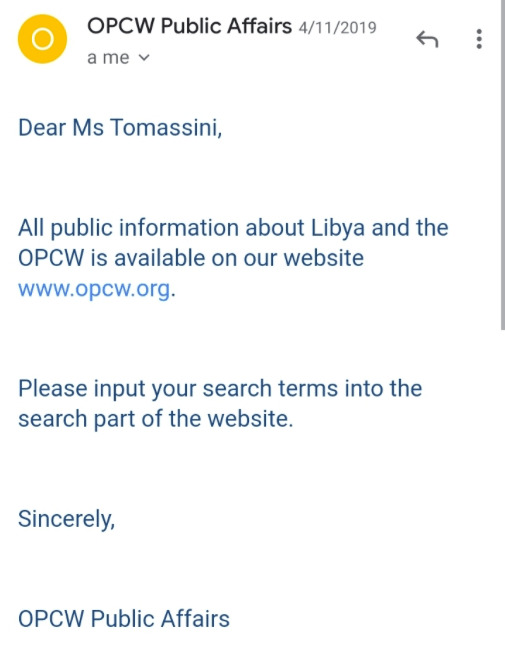
Come vedete dallo screen-shot a sinistra, il 3 novembre 2019 ho contattato via mail l’organizzazione per chiedere spiegazioni su questi fatti avvenuti tra il 2014 e il 2015 in Libia, ma l’ufficio informazioni mi ha rimandato al loro sito internet asserendo che tutto il materiale “pubblico” è già disponibile online.
Il 26 gennaio 2014, OPCW ha annunciato che la Libia ha distrutto il gas mostarda rimanente che riempiva proiettili di artiglieria e bombe aeree, affermando che l’anno precedente la Libia aveva completato lo smaltimento della senape sfusa. Secondo l’organizzazione, entrando a far parte della Convenzione sulle armi chimiche (CWC) nel gennaio 2004, la Libia dichiarò di possedere quasi 25 tonnellate di senape di zolfo sfuso; diverse migliaia di munizioni aeree scariche progettate per l’uso con agenti di guerra chimica; e diversi impianti di produzione di armi chimiche. Le munizioni aeree dichiarate sarebbero state immediatamente distrutte nel marzo 2004 e negli anni seguenti gli impianti di produzione furono distrutti o convertiti a scopi pacifici sotto l’approvazione e la verifica dell’OPCW. Ma non è così. Le operazioni per la distruzione dell’agente sfuso di mostarda di zolfo sono iniziate nell’ottobre 2010 ma sono state sospese nel febbraio 2011 perchè l’impianto di distruzione non funzionava correttamente. In seguito al rovesciamento del Governo di Muammar Gheddafi, il Consiglio di Transizione dichiarò di aver scoperto una grande quantità di munizioni caricate con senape di zolfo che non erano state dichiarate all’OPCW. Ad ogni modo sul sito dell’Organizzazione non vi è alcun riferimento al fatto che possano essere avvenuti dei furti durante le operazioni condotte dall’Organizzazione che tuttavia afferma senza specificare che “la distruzione di queste munizioni è stata una grande impresa in circostanze difficili e tecnicamente difficili”.
Nel 2015, il North African Post, al-Arabiya ed Asharq al-Awasat riferiscono che la quantità di armi chimiche sottratta da uomini armati è sconosciuta, ma avrebbero già trovato la strada verso i militanti fedeli all’ISIS che poco dopo caricano video online in cui sembrano fare esperimenti con razzi carichi di agenti chimici. Fonti militari hanno affermato lo stesso anno che tra le armi chimiche vi erano il gas mostarda e il gas sarin, gli stessi agenti che sarebbero stati usati di recente a sud di Tripoli.
“The North African Post” scrisse, citando un ufficiale delle forze armate libiche, che i luoghi in cui le armi chimiche venivano immagazzinate nel paese erano noti alle milizie. In un discorso televisivo del 2014, Ahmed Gaddaf Addam, cugino di Gheddafi e rappresentante politico del Fronte di Lotta Nazionale rivelava che in Libia c’erano oltre 20.000 tonnellate di gas mostarda prima della morte del rais nell’ottobre 2011, confermando che la distruzione di alcuni arsenali di armi chimiche in Libia è iniziata dopo che il paese ha aderito alla Convenzione sulle armi chimiche nel 2004, ma una parte era già finita nelle mani di gruppi armati.
Alla luce di tutto ciò, è chiaro che il possesso di armi chimiche da parte di gruppi armati di Tripoli e Misurata non è da escludere. Salah Badi, leader della coalizione islamista Libya Dawn, già inserito nelle liste sanzionatorie delle Nazioni Unite, sta combattendo al fronte contro le forze dell’LNA di Khalifa Haftar. La Comunità internazionale ed OPCW dovrebbero accertare se tali armi siano veramente in possesso di questi gruppi armati affiliati al Governo riconosciuto internazionalmente e fare tutto quanto il possibile per la protezione dei civili costantemente sotto attacco di bombardamenti indiscriminati da entrambe le parti.
Read the full article
0 notes
Photo
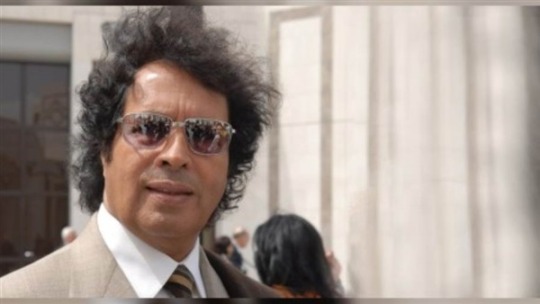
Qaddaf Al-Dam: Qatar's interventions in Libya stem from the sheikhs of extremism Qatar's intervention in Libya stems from the elders of the extremists who kidnapped it, Ahmed Gaddaf al-Dam, a political official of the National Struggle Front and former envoy of the late Libyan leader Muammar Gaddafi, called on Arab countries to find a way out for Doha to retreat from its stalemate.
#AlDam#Arab News#extremism#interventions#Libya#news#political news#Qaddaf#Qatar39s#sheikhs#stem#URGENT#World News
0 notes
Text
Esclusiva. Ahmed Gaddaf al-Dam si rivolge al popolo italiano: “Non siamo solamente barili di petrolio e gas, stiamo soffrendo”
7 agosto 2018.
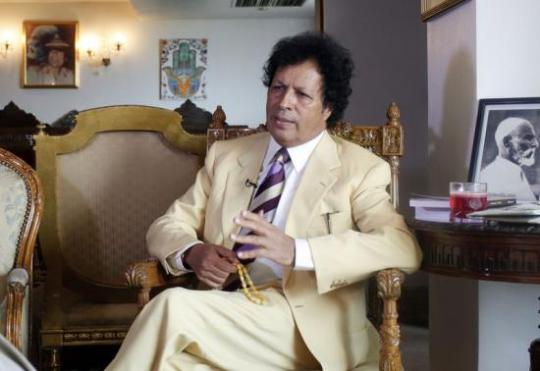
Di Vanessa Tomassini.
Il cugino del rais, Ahmed Gaddaf al-Dam, ambasciatore all’estero durante il periodo di Gheddafi ed attuale leader del Fronte di Lotta Nazionale, in questa intervista esprime tutto il suo dispiacere per la sofferenza vissuta dal popolo libico a causa della politica italiana in Libia e le ultime dichiarazioni dell’ambasciatore Giuseppe Perrone.
– Nei giorni scorsi abbiamo assistito a diverse manifestazioni contro la politica italiana in Libia. Cosa ne pensa?
“Sfortunatamente, la politica italiana verso la Libia è guidata da una mentalità incivile che porta con sè gli accumuli dell’era coloniale. Ne abbiamo sofferto e ne soffriamo ancora oggi, nonostante quello che abbiamo raggiunto con il presidente Berlusconi, quando abbiamo firmato un accordo bilaterale che è stato un onore per tutti fino alla sua ultima pagina. La lezione più importante che abbiamo appreso è che il colonialismo è un progetto fallito. Abbiamo accettato le scuse dell’Italia ed abbiamo gettato le basi per il rapporto futuro. Nel 2011 il nostro Paese è stato bombardato dai missili della NATO e l’Italia ha rotto il suo impegno di non attaccare. Oggi tutti pagano il prezzo di questa scelta, la Libia è stata distrutta e siamo entrati in innumerevoli problemi. Li abbiamo avvertiti, ma invece di correggere gli errori, i governi dell’Italia continuano a punirci con lo stesso spirito del fascismo coloniale, credendo che la Libia possa tornare ad essere una colonia italiana, con il linguaggio della minaccia e del disprezzo per tutti i governi istituiti dai missili della NATO. Dopo il martirio di Gheddafi non c’è legittimità per nessuno. L’Italia ha mandato le sue navi da guerra, soldati a Tripoli e Misurata e Jafra. I soldati delle forze navali libiche non dimenticheranno il comandante della marina libica che gli ha impedito di entrare nel suo ufficio, sebbene sia stato uno dei traditori che avevano arredato il tappeto rosso per ricevere la flotta italiana”.
-Che cosa infastidisce di più i libici?
“L’Italia ha presentato una richiesta per l’acquisto di terreni per usi militari, ha persino domandato alcune proprietà che sostengono di aver posseduto durante il dominio coloniale e forse l’ultimo ospedale psichiatrico nel centro di Tripoli. Questo ha provocato il malcontento ed ha messo in ridicolo i libici. Mi dispiace dire che il nostro ottimismo nel nuovo governo dei giovani è svanito ed abbiamo iniziato a pensare che l’Italia, ‘che è proprietario di una mano longitudinale’ stia negoziando con altri paesi il suo diritto. Abbiamo ascoltato un linguaggio straordinario del ministro della Difesa ed altri. Forse il più recente è quello dell’ambasciatore Giuseppe Perrone che ordina da Tripoli al nostro governo sconfitto la sua decisione di rinviare le elezioni. L’Italia non le permetterà ora. Alcuni clienti di alcune città offrono promesse. Queste dichiarazioni hanno anche portato i nostri giovani di movimenti pacifici libici nelle strade delle città dopo che hanno ricevuto conferma dell’incapacità del Governo di rispondere all’umiliazione e al linguaggio del disprezzo usato dall’ambasciatore. Ne ho già avvertito più di una volta, ve lo ripeto: la Libia di oggi non è quella del 1911. Il 2018 non sarà come in passato, queste generazioni sono state allevate sotto la montagna di orgoglio del periodo Gheddafi, si sono riunite e preparate per una nuova alba. Queste politiche stupide riportano alla memoria ricordi amari. Non lo dimentichiamo. Proteste pacifiche, bandiere bianche continueranno a sorgere in tutte le nostre città e villaggi, finché non sentiremo delle scuse sincere ed un nuovo ambasciatore non faccia promesse esplicite consone all’accordo che abbiamo firmato. Voglio avvertire il vostro ambasciatore di non ridicolizzare più le dozzine di giovani che sono usciti per protestare come ha già fatto. E avverto il governo italiano che i giorni stanno passando velocemente e ciò che possiamo fare insieme oggi, potrebbe essere troppo tardi domani, qualunque cosa nella Libia di oggi di debolezza, umiliazione e silenzio hanno i giorni contati. Abbiamo le potenzialità, le alleanze e difendiamo il nostro diritto alla vita. Mi rivolgo al popolo italiano, amico e vicino, per unirsi a noi al fine di prevenire questa palese delusione. Coloro che portano avanti questa relazione, domani non ci saranno più”.
-Signor Ahmed perché pensa che l’Italia voglia attendere per le elezioni?
“Il fatto che l’Italia voglia rinviare le elezioni è un’altra mancanza di rispetto verso il popolo libico. Questa dichiarazione o questi ordini non aiutano i libici. Queste voci devono essere fermate. Siamo esseri umani, non abbiamo una patria per colpa della vostra aggressione del 2011 che ci ha portato a questa miserabile condizione, non siamo solamente barili di olio e gas, né tantomeno uno spazio per risolvere il conflitto tra Nazioni. Dov’è la civiltà, la sicurezza, i valori la democrazia delle Nazioni Unite in tutto questo?? Spero che non dimenticherete che questo piccolo popolo vi ha affrontato da solo nel 2011, spero che non dimenticherete la rivoluzione del conquistatore nel 1969, che non si aspettava tutte le mine d’Europa. Per 42 anni questo Paese ha controllato le sue risorse ed era un muro di sicurezza nel sud del Mediterraneo. Ha affrontato l’invasione nel Golfo di Sirte e stava guidando il continente africano verso la creazione degli Stati Uniti d’Africa. La Libia ha aperto le porte del bene, della cooperazione e della pace con tutti i suoi vicini, fino a quando non l’avete attaccato nel 2011 con la NATO, senza dichiarare nemmeno lo stato di guerra. Ha resistito 8 mesi con un valore raro, un’epica che deve essere insegnata nei libri di storia, letta e riletta. Ricordo che il governo italiano ha peccato di vanità dopo il mandato del presidente Trump, ma noi non siamo un burattino da passarsi l’un l’altro, lo abbiamo visto nei conflitti passati quando non ci hanno spaventato le flotte che ci assediavano, come quando negli anni Ottanta il mare e l’aria si scontravano quasi quotidianamente nel Golfo di Sirte. Se volete aiutarci o collaborare con noi, questi metodi e questo linguaggio influenzeranno il futuro delle nostre relazioni. So che sono parole dolorose, ma voglio arrivare direttamente a voi anche se so che il Ministro degli Esteri libico ha riferito sulla nostra posizione. Voglio sentire il popolo italiano amico ed aspetterò una vostra risposta…”.
Preso da: https://specialelibia.it/2018/08/07/esclusiva-ahmed-gaddaf-al-dam-si-rivolge-al-popolo-italiano-non-siamo-solamente-barili-di-petrolio-e-gas-stiamo-soffrendo/
https://ift.tt/2nECCu9
0 notes
Text
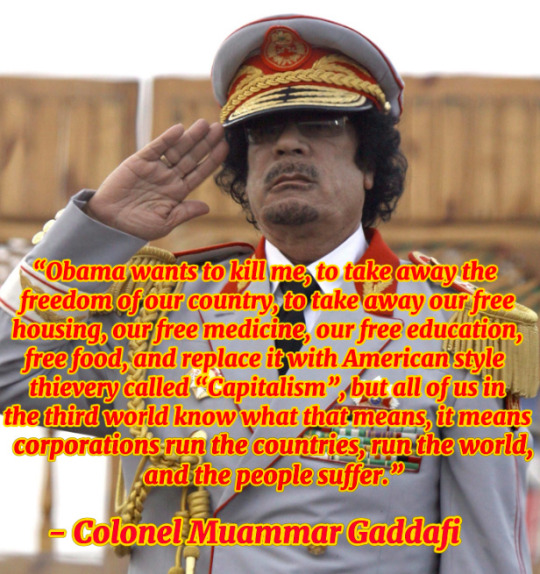
Bam Bam Bam
3 notes
·
View notes
Text

Gaddaf Al-Dam: All Libyan tribes demanded that Saif Al-Islam run for president
3 notes
·
View notes
Text
Gaddafi’s cousin is plotting a comeback of sorts from a Cairo apartment
By Sudarsan Raghavan, Washington Post, November 13, 2017
CAIRO--In an opulent apartment near the Nile River, the late Libyan dictator Moammar Gaddafi lives on.
A faded picture on one wall shows him as a young man lounging in a tent. In another, he’s dressed in military uniform and seated in a plane.
Every week, a group of men who once supported him gather here to discuss Libya’s future and their own fates. Presiding over the meetings in Cairo is Gaddafi’s cousin, whose apartment this is.
“He inhabits the hearts of millions,” Ahmed Gaddaf al-Dam said, glancing at one of the pictures.
Gaddafi’s overthrow and death six years ago reversed the fortunes of his clan and allies, who thrived under his patronage for more than four decades. Tens of thousands of his loyalists fled into exile when he was killed, many to neighboring Egypt. They have remained ever since, yearning for a role in shaping a new Libya.
With Gaddafi’s sons wanted, in exile, in jail or dead, Gaddaf al-Dam has emerged as the main spokesman for the family and tribe. He represents the hopes of Libyans who once had privileged lives, and the anxieties of many others who fear the return of those who backed Gaddafi’s authoritarian rule.
As insecurity and violence grip Libya, Gaddaf al-Dam now senses an opening. He and his supporters are cultivating ties with influential tribes and former rivals disillusioned by the political inertia, seeking to undermine Libya’s weak Western-backed government.
They see opportunity in a new U.N. effort to bring peace, with possible elections next year. The release from jail this summer of Gaddafi’s most prominent son, Saif al-Islam Gaddafi, also gives them hope, though he remains in hiding.
“There won’t be peace without us,” said Gaddaf al-Dam, who bears a striking resemblance to his cousin. “We represent the majority of Libyans. And we want to set things right and correct the past.”
The “past” is the violent revolt, a chapter of the Arab Spring uprisings, and subsequent crackdown by Gaddafi that drew in international powers and NATO airstrikes in 2011. That led to Gaddafi’s ouster and to his death at the hands of militia fighters in the city of Sirte, his birthplace, that year in October.
By then, Gaddaf al-Dam had fled the country.
A key member of Gaddafi’s inner circle, Gaddaf al-Dam was educated in military academies and schools in Britain, Turkey and Pakistan. He helped funnel Gaddafi’s weapons and cash to the anti-apartheid struggle in South Africa and Zimbabwe’s independence movement. He later became Libya’s envoy to Cairo, living in an apartment in the island enclave of Zamalek, and resettled there after the uprising.
In 2013, Libya’s post-revolution authorities issued a warrant for his arrest and sought his extradition, along with other officials of the former regime. Egyptian police raided his apartment and clashed with his guards before he was taken into custody.
Steps from his bedroom, he still keeps a white door riddled with bullet holes as a reminder.
He was acquitted by an Egyptian court after his lawyers argued that he held an Egyptian passport--his mother was Egyptian--and that he had defected from Libya in objection to the killing of protesters.
These days, an arrest is unlikely. Gaddaf al-Dam is close to Egyptian President Abdel Fatah al-Sissi--they trained at the same military academy. Libya is far more divided.
Now 65, Gaddaf al-Dam is youthful-looking, with dark curly hair, and favors tailored suits and bright ties. His apartment is furnished with plush goldtone sofas and ornate wooden chairs. A wall in his study is lined with photos of him with influential dignitaries and tribal leaders.
“A lot of people still trust him, but others accuse him of selling the former regime out by leaving,” said Abdelbasit Ahmed Abu Dieh, former head of the Libyan News Agency. “He has a lot of influence. ... He can help reshape the political scene, but he cannot actually enforce his visions as powerfully as he would have done in the past.”
Gaddaf al-Dam refers to the Libyan revolution as “the disaster.”
He says young Libyans had a “right to go out and protest” the regime, acknowledging that “we weren’t angels.” He describes those who took up arms as traitors.
The revolution would have failed without foreign intervention, he said, and the eight-month “resistance” against NATO “proved the regime had the support of the people.”
“We are the real regime,” he said. “Those ruling now came on top of the missiles over Libya. Missiles do not create legitimacy.”
Gaddaf al-Dam often appears on television in Egypt with a blunt message: The remnants of the old regime must be included in any U.N. and Western-brokered political solution. He has called for the release of thousands of Gaddafi loyalists held in Libyan prisons. Even as he rails against Libya’s revolutionaries, he has called for reconciliation.
Such efforts, though, have been rejected by political players and well-armed militias long opposed to Gaddafi.
Returning to politics would be “really difficult” for Gaddaf al-Dam and Saif al-Islam Gaddafi, said Mohamed Ama’azeb, a senior official with the U.N.-backed Presidential Council in Tripoli. “Security-wise, it is almost impossible. Former regime figures wish their days would be revived, but not everything one wishes for comes true.”
With Libya in turmoil, Gaddaf al-Dam said he is making inroads with powerful tribes, including some who opposed Gaddafi. Since the revolution, many have been marginalized by armed groups.
“When you need to shape the country, you need to see the tribes,” said Ibrahim al-Ghoweil, a former ambassador during the Gaddafi regime. “They must be included. They must hear their voices. This is our culture.”
Gaddaf al-Dam chimed in: “If we had turned to the tribes, we would have never reached this point.”
A group of influential Gaddafi supporters recently gathered in the sun-filled living room of the Cairo apartment. The United Nations had announced a new strategy for Libya that included a referendum on a new constitution and, ultimately, presidential and parliamentary elections.
The United Nations’ special representative for Libya, Ghassan Salame, said the new political process would open the door to “those ostracized, those self-
marginalized, those players who have been reluctant to join the political process.”
It was great news for the group.
“Why should the revolutionaries be the only ones drafting the constitution?” said Ali Hassan Abu Saif, a former captain in Gaddafi’s army.
“I believe the U.N. and the countries that destroyed Libya want us to be part of the discussion, part of the process of regaining peace again in Libya,” Gaddaf al-Dam replied. “I know this government is victimizing us, but we need to get out of this pathetic situation.”
By the end of the meeting, the group had decided to send representatives to help draft a constitution, take part in a national political conference and select members for a presidential council.
“We can’t allow our opponents to choose the members,” said Gaddaf al-Dam, as everyone in the room nodded.
They all agreed that the best person to run their country was Saif al-Islam Gaddafi.
Released in June, after being held by a militia since 2011, he is wanted by the International Criminal Court at The Hague for crimes against humanity. A court in Tripoli has sentenced him to death. Salame told a French television network that Gaddafi could run as a candidate in the planned elections next year.
At a news conference in Tunis last month, a lawyer for the Gaddafi family said Saif al-Islam was in good health and closely following developments in Libya.
Today, Saif al-Islam’s supporters are keeping his whereabouts secret for security reasons, though some in the apartment said they were in contact with him. They insisted that Libyans would accept another Gaddafi and noted that before Saif al-Islam joined his father in suppressing the rebellion, he supported political freedoms, free-market reforms and opportunities for Libya’s youth.
“He’s not like his father,” said Noor Ibrahim, a young lawyer.
In the living room, there’s a portrait of the dictator superimposed over a picture of Omar Mukhtar, the Libyan leader who fought the Italian colonialists before they hanged him in 1931. Today, Mukhtar is viewed as a symbol of resistance in the Arab world.
That’s how Gaddaf al-Dam believes the world will one day view his cousin.
“He will be a saint for Libyans, Arabs, Muslims and Africans,” he said. “All Libyans are now regretting that Gaddafi is not here. They wish they could go back to his days.”
0 notes
Photo

And this video :D
#i'll tag it as gaddafi but in that pic it looks more like ahmed gaddaf al-dam#gaddafi#muammar gaddafi#libya#arafat#yasser arafat#palestine#submission
0 notes
Text
Barack Obama Legacy - Over 400 Legislative Accomplishments
Barack Obama Legacy – Over 400 Legislative Accomplishments
President Obama, our 44th president. Regardless of your political views, President Obama passed more Legislative Acts than any other president since Franklin D Roosevelt’s and possibly out bench-marked Roosevelt’s legacies. President Obama did Prevented the onslaught of a Depression, while Improved the overall Economy. And maintained a Scandal Free Administration!
No more Sour Grapes regarding…
View On WordPress
#Achieved New START Treaty#Don’t Tell#Expanded Pell Grant Spending#Health Care Reform#Increased Support for Veterans#Michelle Obama#Race to the Top#Repealed “Don’t Ask#Reversed Bush Torture Policies#Toppled Moammar Gaddaf
0 notes
Text
Ex-aide to Gadhafi fears arrest over Sarkozy corruption case
New Post has been published on https://goo.gl/bVFyvN
Ex-aide to Gadhafi fears arrest over Sarkozy corruption case
CAIRO/April 2, 2018 (AP)(STL.News) —A top aide to former Libyan dictator Moammar Gadhafi said on Monday he fears arrest if he returns to Libya over what he may know about corruption allegations against France’s ex-President Nicolas Sarkozy and Gadhafi’s alleged financial support to the former France leader.
Moftah Missouri, Gadhafi’s chief interpreter and also his adviser since 1996, told The Associated Press that he attended a meeting in 2005 between France’s then-Interior Minister Sarkozy and Gadhafi.
Missouri, who is now living in exile in Tunisia, said over the phone that Gadhafi told Sarkozy during the meeting that he’s “pleased to have a friend like you as a president of France.”
Sarkozy allegedly revealed his aspirations to run for president and according to Missouri, Gadhafi told Sarkozy: “We will help you if you run in the election.”
Sarkozy’s lawyer and spokeswoman did not immediately respond to requests for comment on Monday.
The Gahdafi-Sarkozy meeting, Missouri said, took place inside Gadhafi’s sprawling tent in Tripoli, the Libyan capital, and lasted for about 45 minutes. Officials from both sides attended but Missouri said he does not remember the exact date.
“The talk was in general terms,” Missouri said, adding that Gadhafi and Sarkozy did not discuss any specific money amounts.
Missouri, who was also the head of the so-called France Bureau at the Libyan foreign ministry, said that later, he saw a document sent from a Libyan team negotiating the terms of support with the French.
Asked who would know if and what sum of money was delivered to Sarkozy, Missouri said it would be Gadhafi’s chief “accountant,” Salem al-Qomodi, who is currently under house arrest in Libya.
Missouri said that also present at the 2005 meeting were Gadhafi’s former chief-of-staff Bashir Saleh and French-Lebanese businessman Ziad Takieddine — who later told the online investigative site Mediapart that he delivered suitcases from Libya containing 5 million euros ($6.2 million) in cash to Sarkozy and his former chief of staff, Claude Gueant.
Last month, Sarkozy was handed preliminary charges that he took millions of illegal campaign financing from Gadhafi. He vigorously denied the accusations on French television. An investigation has been underway since 2013 into the case.
Missouri also said that the last correspondence between Gadhafi and Sarkozy took place a couple of months before the Libyan leader’s death at the hands of rebels. Gadhafi offered to step down but remain in Libya, Missouri said.
There was no answer from Sarkozy, Missouri said.
As France’s president from 2007 to 2012, Sarkozy put France in the forefront of the NATO-led airstrikes against Gadhafi’s troops that helped rebel fighters topple Gadhafi’s regime in 2011.
After Gadhafi’s fall, Libya was plunged into chaos and rebel groups became a myriad of militias, loosely allied with competing governments based in the country’s western and eastern halves.
Sarkozy wasn’t the only international figure Gadhafi funneled money to, Missouri said, adding that he had advised Gadhafi to reveal the amounts given to each and every politician, for the sake of transparency, “but he didn’t listen.”
Missouri declined to identify other politicians who received Libyan money.
What sparked his fears, Missouri said, were reports in local Libyan media about authorities’ intentions to arrest him upon his return for speaking publicly about Sarkozy’s corruption case.
Last month, one of Gadhafi’s cousins, Ahmed Gaddaf al-Dam who lives in Cairo, told the AP that those know about the corruption case against Sarkozy were either arrested, killed, or escaped assassination attempts.
“The Libyan authorities will be held responsible for any assault or arrest” on me, Missouri said. Any assault would “amount to an impediment to justice.”
___
By MAGGIE MICHAEL, By Associated Press – published on STL.News by St. Louis Media, LLC (A.S)
___
#Corruption case#Ex-aide to Gadhafi fears#Pleased to have a friend like you as a president of France#Sarkozy corruption case
0 notes
Text
— why I don’t. But all these people just attacking me for no reason when they don’t even know me don’t even think about what it is they’re actually doing.
To them, it’s “exciting drama,” like watching a movie or something. But actually, you’re murdering someone on the inside —
— Только ты не при чем (@Gaddafism) March 26, 2018
0 notes
Text
Qaddafi’s cousin calls Sarkozy charges ‘God’s punishment’ – Middle East Affairs
Muammar Qaddafi’s cousin says the corruption allegations against former French President Nicolas Sarkozy are “God’s punishment” for his role in the NATO-backed uprising that toppled and killed the longtime Libyan leader. Ahmed Gaddaf Al-Dam, a close aide to Qaddafi based in Cairo, told The Associated Press that he was aware of the millions of euros […]
Source: Qaddafi’s cousin calls Sarkozy charges ‘God’s punishment’ – Middle East Affairs
from WordPress http://ift.tt/2GiA8wo
via IFTTT
0 notes